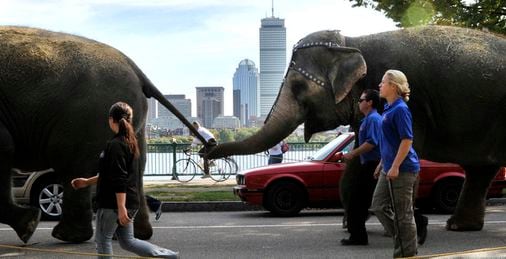Animal rights advocates have argued that animals in traveling shows are subjected to cruel conditions and confinement and that although their use in circuses have waned, the shows still exist.
The bill emerged amid a string of animal-centric proposals the House approved during one of its final formal sessions of the year. If signed into law, the proposal would make Massachusetts the 11th state to adopt such a ban on using big cats and exotic creatures in traveling shows and would expand similar rules that more than a dozen towns and cities in Massachusetts have already adopted.
The Massachusetts House unanimously passed legislation Thursday that would bar circuses and traveling shows from using elephants, tigers, and other animals in their acts in the state, embracing a ban activists have pushed on Beacon Hill for decades.
Advertisement
Up until 2020, King Richard’s Faire, New England’s largest Renaissance festival, had featured an exotic cat show. The Big E in West Springfield also had an elephant exhibit until 2019, when a popular Asian elephant, Beulah, died after collapsing at the fair. Federal officials later said Beulah, who had been central to a legal effort to grant animals “personhood,” died from blood poisoning caused by a uterine infection.
Public opinion about using animals in shows has been changing “slowly,” said Preyel Patel, the Massachusetts state director for the Humane Society of the United States. Though some of the most well-known attractions have stopped using animals — Ringling Brothers and Barnum & Bailey Circus dropped its animal acts when it returned last year — many states’ laws haven’t caught up: Advocates in Massachusetts first began pushing a version of the ban at the State House in 2001, Patel said.
“Massachusetts is finally stepping into the 21st century,” she said Thursday of the House’s 157-0 vote.
The proposal would prohibit using an array of animals in shows, including elephants, bears, big cats such as lions and clouded leopards, “non-human primates,” and giraffes. It would not apply to zoos or any other facility where the animal is considered a “resident.”
Beulah, a 54-year-old Asian elephant, died in 2019 after collapsing at the Big E. The Big E
The legislation still has to clear the Senate before it could reach Governor Maura Healey’s desk. Lawmakers are scheduled to wrap up formal sessions on Wednesday, meaning the bill, like others, would have to survive the Legislature’s familiar end-of-session crush.
Advertisement
State Representative Carole Fiola, a Fall River Democrat who co-sponsored the bill, said she began embracing the ban after taking a safari in Africa in 2019. “Seeing these animals in their natural state . . . highlighted the unnatural inhumane treatment these animals face in traveling acts,” she said.
At least 15 communities in Massachusetts have passed similar bans, including Topsfield, which is home to a popular annual fair and in 2019 prohibited the use of elephants and other wild animals for entertainment there.
“There is a lot of animal suffering that is part of this industry. It’s unavoidable,” Liz Magner, the MSPCA’s animal advocacy specialist, said in a phone interview. “They are often on the road for much of the year, they are often kept in extreme confinement. . . . There is no humane way to transport an elephant, to drag it across states and meet its needs.”
Not all agree. Eugene Cassidy — the president and chief executive of the Eastern States Exposition, which runs the Big E — said activists have routinely “mischaracterized” the conditions that traveling animals live in, noting that the elephant, Beulah, was 54 years old when she died. The median life expectancy for female Asian elephants is 47, according to the Smithsonian’s National Zoo.
“No fair manager or individual would employ an animal handler who maltreated their animals,” said Cassidy, who said he would bring elephants back to the Big E, but that “nobody wants to bring them out.”
Advertisement
“I would pay any price to get an elephant here,” he said. “Exposing young people, or old people like myself, [to these animals] is a positive thing. It’s a way for people to have first-person experiences.”
The House passed a range of other animal-related bills Thursday. One would create a commission that would, in part, investigate the “prevalence and impact of fraud, misrepresentation and other misuse of service animals.” Another would require that Massachusetts create statewide regulations for dog day care facilities.
Matt Stout can be reached at matt.stout@globe.com. Follow him @mattpstout.




